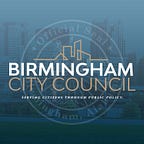Councilor Wardine Alexander meets with clergy, law enforcement and neighborhood leaders to address public safety concerns
For District 7 City Councilor Wardine Alexander, one of the main areas of focus during her tenure has been on addressing public safety needs in her communities.
Alexander recently hosted two quarterly meetings — the Coffee with the Clergy meeting and the Chat and Chew roundtable with neighborhood leaders. These quarterly meetings are a way to engage with law enforcement officials, clergy and neighborhood leaders and bring these groups together in order to work collectively toward improving the quality of life for Birmingham’s residents.
“I’ve lived in District 7 most of my life. I graduated from Wenonah High School and I live over there in Roosevelt City,” Alexander said during last week’s Coffee with the Clergy discussion. “I want our neighborhoods to be safe. When someone gets out of their car at night I don’t want them to have to worry when they’re unloading groceries. I’m one of those people that will always call the non-emergency police number if I see something suspicious. People living in the neighborhoods know what looks suspicious and the police rely on them to keep an eye out.”
During the Coffee with the Clergy discussion, which is a way to facilitate open dialogue with church leaders in District 7, the conversation revolved around the role of work force development as a way to steer the city’s youth in a positive direction and empower them to get the path to a successful career.
“I believe we have an untapped resource in District 7 with Lawson State Community College. I think that if we get our children trained and educated it will improve the quality of life throughout the city. It gives our children the opportunity to work toward something and make a living. We’re so excited about the work our churches have been doing on that front.”
Dr. Michael W. Wesley Sr., senior pastor at Greater Shiloh Missionary Baptist Church, explained how he hopes local churches can work together to bring workforce development opportunities to the communities they serve.
“One of the challenges here, with different churches in Birmingham, is we’ve had a hard time wanting to work together,” Wesley explained. “Nothing can be done without a vision. Imagine the great things we’d be able to accomplish if all the churches came together with a vision for our youth to create a path to success. This is the key to neighborhood revitalization. Our Cornerstone Foundation’s YouthBuild program focuses on the youth between the ages of 18 and 24 who have come from low-income families and may have had run ins with the law. They learn skills while rebuilding homes, laying a foundation for future careers while rebuilding our communities.”
Birmingham Police Chief Patrick Smith spoke during the breakfast meeting with church leaders and detailed the ways in which his department have been utilizing resources and personnel in accordance with areas that need more help.
“Over here, you all have been underserved,” Smith said, speaking at Greater Shiloh Ministry Baptist Church on Jefferson Ave. SW. “As a result, there were 48 of 99 homicides on this side of town. That’s 50 percent of the homicides, but you were previously only receiving 25 percent of the police resources. We’ve changed the way we do business to address these issues.”
One such program that has seen success in District 7 is the Neighborhood Block Watch program, which was discussed when neighborhood leaders met with Councilor Alexander at Regions Field on Friday for the second quarterly Chat and Chew roundtable.
John Wilson Jr., president of the Grasselli Heights Neighborhood Association, said he has been encouraged by the cooperation between neighborhood residents and city officials when it comes to public safety concerns. He recently had an incident where an intruder broke into his home. One of his key takeaways from the conversation was how police and residents can work together.
“When the police come out an interview you for a crime that might have happened in the community, if you’re not satisfied with that, you can go further and find out more about why this issue was not taken care of,” Wilson explained. “Also our Neighborhood Block Watch program is very good. We can get folks throughout the neighborhood involved. It helps empower people and that’s where you have to start if you want to make the world a safer place.”
